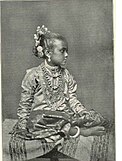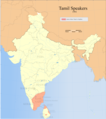The Tamils portal
The Tamils (/ˈtæmɪlz, ˈtɑː-/ TAM-ilz, TAHM-), also known as the Tamilar, are a Dravidian ethnolinguistic group who natively speak the Tamil language and trace their ancestry mainly to the southern part of the Indian subcontinent. The Tamil language is one of the longest-surviving classical languages, with over two thousand years of written history, dating back to the Sangam period (between 300 BCE and 300 CE). Tamils constitute about 5.7% of the Indian population and form the majority in the South Indian state of Tamil Nadu and the union territory of Puducherry. They also form significant proportion of the population in Sri Lanka (15.3%), Malaysia (7%) and Singapore (5%). Tamils have migrated world-wide since the 19th century CE and a significant population exists in South Africa, Mauritius, Fiji, as well as other regions such as the Southeast Asia, Middle East, Caribbean and parts of the Western World.
Archaeological evidence from Tamil Nadu indicates a continuous history of human occupation for more than 3,800 years. In the Sangam period, Tamilakam was ruled by the Three Crowned Kings of the Cheras, Cholas and Pandyas. Smaller Velir kings and chieftains ruled certain territories and maintained relationship with the larger kingdoms. Urbanisation and mercantile activity developed along the coasts during the later Sangam period with the Tamils influencing the regional trade in the Indian Ocean region. Artifacts obtained from excavations indicate the presence of early trade relations with the Romans. The major kingdoms to rule the region later were the Pallavas (3rd–9th century CE), and the Vijayanagara Empire (14th–17th century CE). The island of Sri Lanka often saw attacks from the Indian mainland with the Cholas establishing their influence across the island and across several areas in Southeast Asia in the 10th century CE. This led to the spread of Tamil influence and contributed to the cultural Indianisation of the region. Scripts brought by Tamil traders like the Grantha and Pallava scripts, induced the development of many Southeast Asian scripts. The Jaffna Kingdom later controlled the Tamil territory in the north of the Sri Lanka from 13th to 17th century CE. European colonization began in the 17th century CE, and continued for two centuries until the middle of the 20th century. (Full article...) Selected article - Jallikattu (or Sallikkattu), also known as Eru Taḻuvuṭal and Manju-virattu, is a traditional event in which a zebu bull (Bos indicus), such as the Pulikulam or Kangayam breeds, is released into a crowd of people, and many human participants attempt to grab the large hump on the bull's back with both arms and hang on to it while the bull attempts to escape. Participants hold the hump for as long as possible, attempting to bring the bull to a stop. In some cases, participants must ride long enough to remove flags on the bull's horns. Jallikattu is typically practised in some regions of the Indian state of Tamil Nadu (particularly in Southern and Western Tamil Nadu) as a part of Pongal celebrations on Mattu Pongal day, which occurs annually in January. (Full article...) General imagesSelected biography -C. Subramania Bharati (IPA: /ˌsuˈbrəˌmənˈjʌ ˈbɑːˌrʌθi/; born C. Subramaniyan 11 December 1882 – 12 September 1921) was an Indian writer, poet, journalist, teacher, Indian independence activist, social reformer and polyglot. He was bestowed the title Bharati for his poetry and was a pioneer of modern Tamil poetry. He is popularly known by his title Bharati or Bharathiyaar and also by the other title "Mahakavi Bharati" ("the great poet Bharati"). His works included patriotic songs composed during the Indian Independence movement. He fought for the emancipation of women, against child marriage, opposed the caste system, and advocated reforms of the society and religion. Born in Ettayapuram of Tirunelveli district (present-day Thoothukudi) in 1882, Bharati had his early education in Tirunelveli. He later lived in Varanasi for sometime when he was exposed to Hindu theology and new languages. He worked as a journalist with many newspapers, including Swadesamitran, The Hindu, Bala Bharata, Vijaya, Chakravarthini and India. He considered Sister Nivedita, a disciple of Swami Vivekananda, as his guru. (Full article...) CategoriesTopicsTamil People Countrywide: India • Sri Lanka • Canada • Malaysia • Singapore • South Africa • England Related Ethnic Groups: Brahui • Gond • Kannadiga • Khonds • Kodava • Oraon • Malayali • Telugus • Tuluvas Related indigenous Groups: Badagas • Toda • Kuruba
See also: List of Tamil people, Tamil script, Tamil Script Code for Information Interchange Related portalsWikiProjectsThings to do
Associated WikimediaThe following Wikimedia Foundation sister projects provide more on this subject:
Discover Wikipedia using portals |

























































